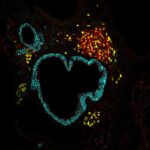
Publication: Shp-2 Is Dispensable for Establishing T Cell Exhaustion and for PD-1 Signaling In Vivo
Publié dans: Cell Reports, 2018, 23 (1), pp.39-49. ⟨10.1016/j.celrep.2018.03.026⟩
Auteurs: Giorgia Rota, Charlene Niogret, Anh Thu Dang, Cristina Ramon Barros, Nicolas Pierre Fonta, Francesca Alfei, Leonor Morgado, Dietmar Zehn, Walter Birchmeier, Eric Vivier, Greta Guarda
Résumé
In chronic infection and cancer, T cells acquire a dysfunctional state characterized by the expression of inhibitory receptors. In vitro studies implicated the phosphatase Shp-2 downstream of these receptors, including PD-1. However, whether Shp-2 is responsible in vivo for such dysfunctional responses remains elusive. To address this, we generated T cell-specific Shp-2-deficient mice. These mice did not show differences in controlling chronic viral infections. In this context, Shp-2-deleted CD8(+) T lymphocytes expanded moderately better but were less polyfunctional than control cells. Mice with Shp-2-deficient T cells also showed no significant improvement in controlling immunogenic tumors and responded similarly to controls to alpha-PD-1 treatment. We therefore showed that Shp-2 is dispensable in T cells for globally establishing exhaustion and for PD-1 signaling in vivo. These results reveal the existence of redundant mechanisms downstream of inhibitory receptors and represent the foundation for defining these relevant molecular events.
Lien vers HAL – hal-04831567
Lien vers le DOI – 10.1016/j.celrep.2018.03.026

